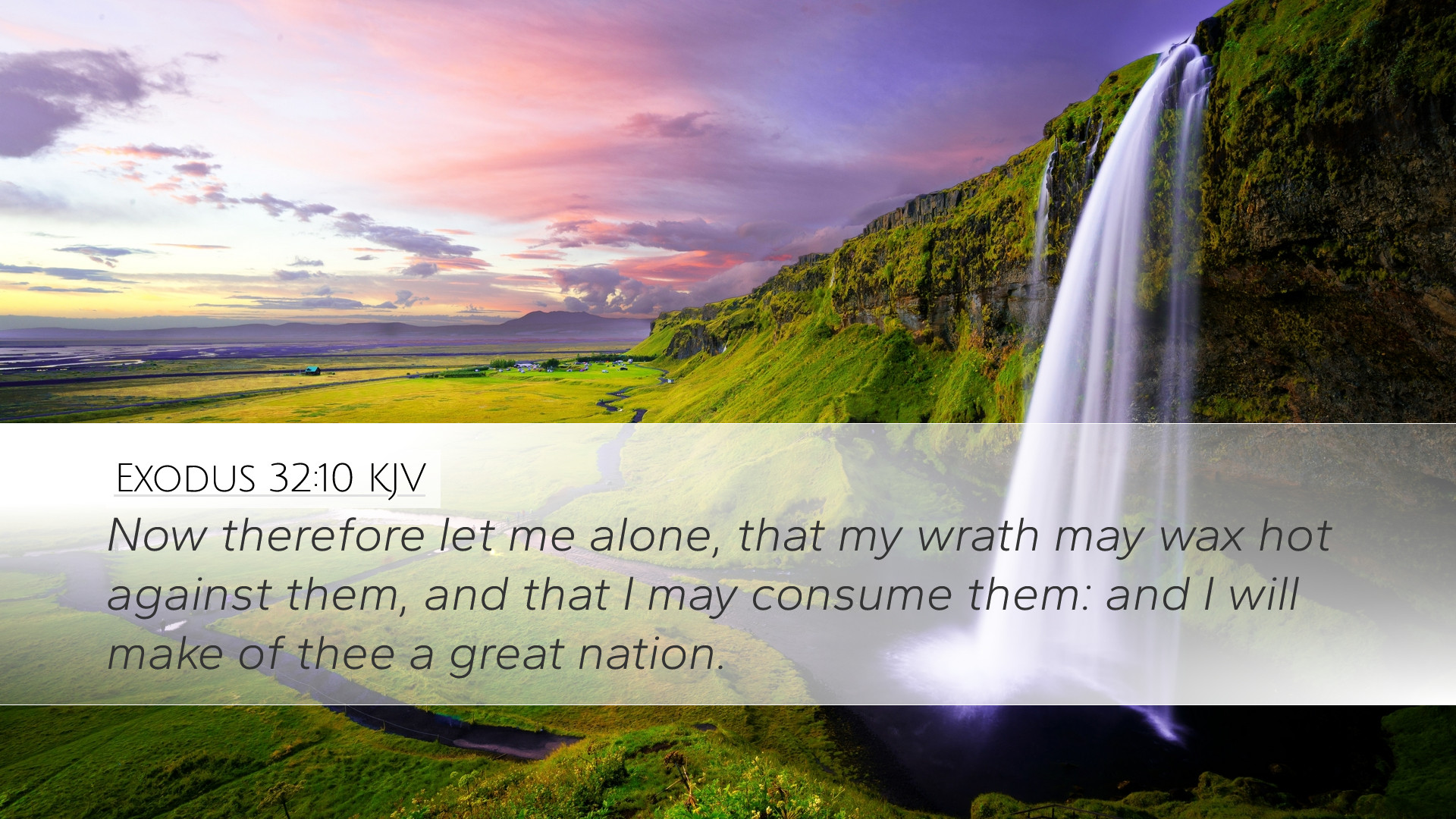Commentary on Exodus 32:10
Exodus 32:10 states:
"Now therefore, let me alone, that my wrath may wax hot against them, and that I may consume them: and I will make of thee a great nation."
Introduction
This verse occurs in a pivotal moment in the Exodus narrative, right after the Israelites have constructed the golden calf. God's anger is provoked due to their idolatry, and He informs Moses of His intention to consume the people. This passage reveals profound themes of intercession, divine justice, and mercy.
The Context of the Passage
Prior to this verse, Moses had ascended Mount Sinai to receive the law, during which time the people below grew restless and fashioned a golden idol. This action represents a severe breach of covenant loyalty and covenant theology, setting the stage for God to declare His judgment. Commentators note that this event is foundational in understanding Israel's relationship with God and the nature of divine mercy.
Insights from Commentators
Matthew Henry's Commentary
Henry emphasizes the gravity of Israel's rebellion and the justifiable anger of God. He notes:
- Divine Wrath: God's declaration to "consume them" shows His holy nature, which cannot permit idolatry. Henry posits that such rebellion deserves the severest punishment.
- Moses as Intercessor: This situation illustrates Moses's role as a mediator. His relationship with God enables him to plead for the people's forgiveness, which echoes the New Testament themes of intercession through Christ.
- Consequences of Sin: The consequences of sin impact not only the individual but the entire community. God's plan to make a great nation from Moses illustrates His ability to bring good from evil.
Albert Barnes' Notes on the Bible
Barnes provides a theological examination of the implications of God's wrath and the covenant with Israel:
- The Nature of God: Barnes writes about the balance between God's justice and mercy, emphasizing that God's anger is not arbitrary but rooted in His righteousness.
- Implications for Leadership: The verse also serves as a testimony to the burden of leadership. Moses is confronted with the reality of his people's sin, and it is his responsibility to respond appropriately.
- Potential for Renewal: The mention of creating a "great nation" from Moses suggests that even in judgment, God retains the possibility for renewal and future blessings.
Adam Clarke's Commentary
Clarke delves into the finer details of the Hebrew text and cultural context, providing additional insights:
- Understanding God's Anger: Clarke discusses the anthropomorphic language used to express God’s feelings. He notes that God’s anger is not like human anger, but it signifies a response to sin that must be taken seriously.
- Covenantal Themes: Clarke highlights the significance of the covenant relationship, which requires faithfulness. The failure of the Israelites tests this covenant, and God's response seeks to uphold His holiness.
- Moses' Intervention: Clarke points out that God's proposal to start anew with Moses reflects the patience and long-suffering of God. Moses’s intercession is not merely a plea; it is a powerful act of leadership that points to Christ’s ultimate mediation.
Theological Implications
This passage holds several vital theological implications:
- Understanding Idolatry: The gravity of idolatry in Israel's history serves as a reminder for the contemporary church about the importance of fidelity to God.
- The Role of Intercession: The power of prayer and intercessory action is underscored here. Moses’s advocacy for the people reveals the importance of leaders who stand in the gap for their communities.
- God's Justice and Mercy: This verse encapsulates the tension between judgment and grace. While judgment was warranted, God ultimately preserves Israel through Moses' intercession, pointing to the greater redemptive work of Christ.
Application for Today
For pastors, students, and scholars, the exploration of this verse encourages deep reflection on several levels:
- Leadership and Responsibility: What does it mean to be a leader in faith communities today? How does one navigate calls for judgment with the need for mercy?
- Facing Idolatry: In what ways can contemporary Christians fall into idolatry, and how can they counteract those tendencies?
- Intercessory Prayer: The power and necessity of intercessory prayer within churches should be acknowledged and practiced as a vital component of faith life.
Conclusion
Exodus 32:10 serves as a profound reminder of the complexities of God's relationship with His people. Acknowledging both His holiness and His mercy is essential for a proper understanding of the biblical narrative. The insights from Matthew Henry, Albert Barnes, and Adam Clarke enrich our comprehension of this critical event in Israel's history and its implications for faith today.


